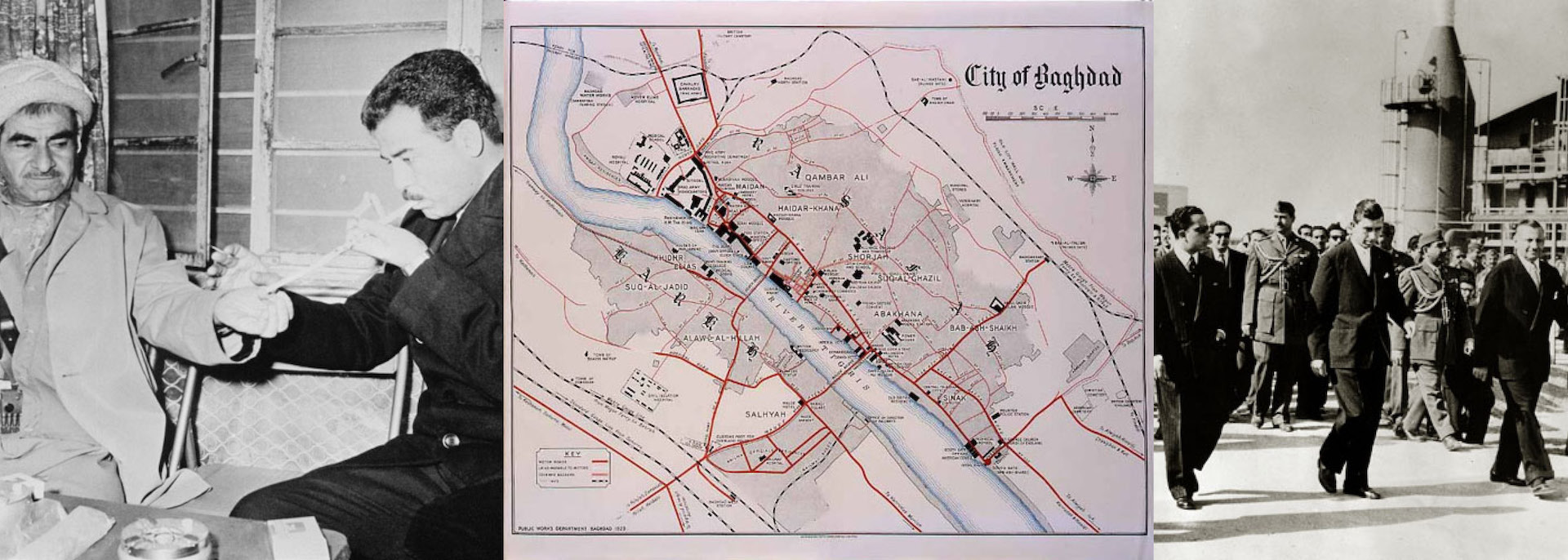Timeline
Timeline PDF
Dr Charles Tripp, A History of Iraq, Cambridge University Press, 2000
© Cambridge University Press 2000. Reproduced with permission of Dr Charles Tripp and Cambridge University Press.
Essays
The below essays are provided to introduce users to the material available in this archive, and to explain its importance to the study of the history of Iraq. Each essay contains links that take you straight to the document being referenced (provided your institution has access to this material).
Introduction PDF
Dr Charles Tripp, Reader in Politics, School of Oriental and African Studies, University of London
This introduction marks the National Archives at Kew as the major single source for understanding the process which formed the modern state of Iraq and its politics, allowing researchers to form accurate impressions of British administrators, their concerns, their views of Iraq and the Iraqis and their reasons for devising policies that were to have had a marked effect on the course of political history. It is possible to follow the fluctuation of British influence and the struggles faced through the rise of Rashid Ali al Gailani, Kurdish nationalism and finally the 1958 revolution, during which the monarch appointed by Britain was shot. The 1960s saw instability and violence in Iraqi politics and the return of the Baath government, the wealthiest and most powerful in Iraqi history, introducing Saddam Hussein as a key player in 1968.
The British Mandate in Iraq, 1914-1932 PDF
Dr Toby Dodge, The International Institute for Strategic Studies
This essay focuses on the state of Iraq under the British Mandate, dividing the period of British intervention into four stages, 1914-1920, 1920-1923, 1923-1927 and 1927-1932. In April 1920, Britain formally accepted responsibility for building an Iraqi state, out of the post-war wreckage of the Ottoman Empire, through the League of Nations Mandate. Dr Dodge discusses the reasons for Britain’s failure in Iraq, which include the transformation of the international system between the First and Second World Wars and the changes in British government policy due to the rise of American power and President Woodrow Wilson’s active liberalism.
Iraqi Society, 1914-1974 PDF
Professor Tareq Ismael, University of Calgary
The state of Iraq was formed through the integration of the three autonomous administrative provinces, Basra in the south, Baghdad in the centre and Mosul in the north, in 1914. The de-classified British archives suggest that Britain occupied Basra due to the economic wealth and oil potential of Iraq, as well as its geopolitical position and forewent nation building in favour of the creation of a modern state, forging a civil society, which initially consisted of cleavages of pre-modern socio-economic and political formations. The presence of foreign bases, forced labour in the construction industry and the Anglo-Indian staff of the bureaucracy were unsettling and a catalyst for the growing fervour of nationalism among Iraqis. This ultimately resulted in the 1968 coup, the Ba’th Party, which was later lead by Saddam Hussain, claimed power. This regime was particularly noted for its ruthless oppression.
The Iraqi Communist Party 1934-1979 PDF
Professor Peter Sluglett, Middle East Center, University of Utah
Although brutally persecuted for the greater part of its existence, the Iraqi Communist Party (ICP) was highly influential in Iraqi politics, particularly from the 1950s to the 1970s. The ICP was not able to come out into the open prior to the Revolution of 1958, forming part of the opposition to the old regime. A Ba’thist-Communist ‘Progressive National Front’ was established in 1973 and, in hindsight, the ICP’s adhesion to the Front was an almost suicidal act, but the party was granted a lot of freedom by the Ba’th regime through the Front and the benefits seemed to represent substantial achievements. These did not last long, as the ICP had fully supported the regime for so long, they could not criticise its policies, their participation in the Front ultimately strengthened Ba’thist rule, allowing the regime to build up its own organisations and institutions unopposed.
The Kurdish Question in Iraq, 1914-1974 PDF
Dr Gareth Stansfield, University of Exeter
The ‘Kurdish Question’ did not exist prior to the introduction of the mandate in 1914. The establishment of new states from the territories of the Ottoman Empire brought the Kurds to the light as a distinct people who could be granted an independent state. This question developed into one of how to manage the Kurds within the confines of the states defined by the imperial powers.
Islam and the Left in Iraq PDF
Emeritus Professor Sami Zubaida, Birkbeck College, University of London
Islam was divided into two strands with the creation of the state of Iraq, Sunni and Shi’I. Both played a crucial factor in politics and society, particularly influencing attitudes to the Left, primarily the Iraqi Communist Party. The separate strands enjoyed different degrees of power within the state, with Sunni as the official religion from Ottoman times, and Shi’I, although excluded from government, possessed a high degree of autonomy.
Return to Archive
Other selected Middle East resources
Gale is not responsible for external links.
The Avalon Project at Yale Law School
The Middle East Studies Association
British Society for Middle East Studies
The Gertrude Bell Project, University of Newcastle

© The National Archives, UK, 0000404600-004 RM; © The National Archives, UK, FO 925/41384; © The National Archives, UK, PN230154195

